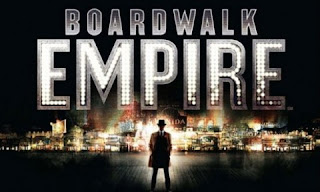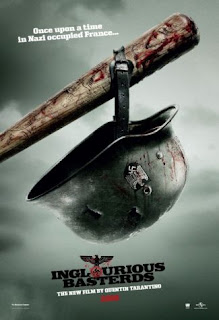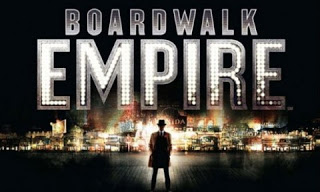 |
| HBO’s Boardwalk Empire |
Tag: Amanda ReCupido
Guest Writer Wednesday: Boardwalk Empire
Movie Review: Inglorious Basterds
 *This is a guest post from the author of The Undomestic Goddess.
*This is a guest post from the author of The Undomestic Goddess.
To recap: The film starts out in a brutally tense scene in the farmlands of France where the “Jew Hunter” (played brilliantly by Christopher Waltz) finds and kills a Jewish family in hiding, missing only the young Shosanna, who escapes (her bravery here foreshadowing her later triumph). We later see her fixing up the marquee of her own cinema (a woman owning a theater = YESSSS), which we’re told was left to her by her deceased aunt and uncle, who she presumably ran away to after leaving her murdered family. (It should also be said that she has a black man in her employ – in the still-racist 1940s – and they appear to be lovers. Bonus equality points and for seeking out a fulfilling relationship.) Here a young German soldier and war hero strikes up a conversation with her. Later we find out that a German propaganda film has been made about his exploits, and he wants her cinema to host the premiere. This means that all the Nazi higher-ups would be in her theater, including Hitler himself. And so she gets the brilliant idea to burn the theater down.
Meanwhile, Brad Pitt and his buddies also have their eyes set on blowing up the theater, but their plans don’t go as smoothly as Shosanna’s (again, men = suspicion). They rendezvous with the famous German actress (and undercover British agent) Bridget von Hammersmark (played by Diane Kruger), only to have it blow up in their faces. A note about Miss von Hammersmark: Out of the two main female characters, Shosanna and Bridget, she is the one with the overt sexuality, the typical female allure, the glamour of the movie star. And she is the one who gets into the most trouble. Even with her power of celebrity, she cannot overcome the politeness of womanhood to get herself (and her cohorts) out of a sticky situation with German soldiers in a bar, or out of a confrontation with a dangerous old friend (well, he is the “Jew Hunter,” and even my boyfriend remarked, “NO ONE says ‘no’ to an SS Officer”). Her femininity ends up to be her downfall, while Shosanna’s typically feminine silence offers her power.
But while Shosanna is able to complete her scheme, her projected sexuality gets her into trouble, too. The German’s soldiers’ aggression and sexual advances leaves her with no choice but to shoot him, and in a moment of presumed “feminine” weakness, feels sorry for what she has done, goes to check on him, and gets shot herself. I really hate the two actions done by the women in the moments before their respective deaths. I can’t agree that Shosanna, so cool and calculated and plotting (typically cinematic male characteristics) would have regretted saving her own life by shooting an enemy soldier and in who she never really had any interest in the first place. And I hate the fact that Bridget, already sensing that the SS Officer has found her out, allows herself to be escorted into an empty (ie “where no one can hear you scream”) room with him. While the female characters are not perfect, this just illustrates how each could not overcome their second-class status in the male-dominated Nazi regime.
But in the end, Shosanna is our real hero. By her edits of the propaganda film, her face is the last the Nazis see as the theater burns. As the movie ends, we learn that the Jew Hunter will get credit for the theater burning and the end of the war, but we really know that this time, it took the cunning of a woman to fell the most evil of men.
Amanda ReCupido is a writer and arts publicist living in New York City. She is the author of the blog The Undomestic Goddess and can be found on Twitter at @TheUndomestic.


